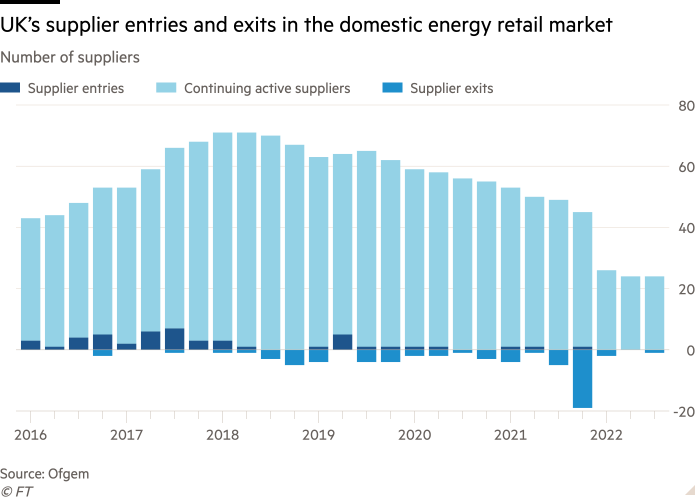Energy retailers grapple with PR crisis
Gemma Hatvani has worked in the energy industry for 20 years but has not experienced anything like the past couple of months as struggling households flock to her Facebook-based service, Energy Support and Advice UK.
“It’s horrendous . . . the demand from people needing food parcels, top-up vouchers . . . I know we hear this word a lot but it’s unprecedented,” said Hatvani, a former business analyst for energy supplier Eon.
Public and political anger towards electricity and gas retailers in Britain — which as consumer-facing businesses often bear the brunt of fury towards the wider energy industry — is already heightened after revelations this month of forcible installations of expensive prepayment meters in the homes of vulnerable British Gas customers.
But executives are braced for the criticism to ramp up further as the parent companies of some of the country’s biggest suppliers prepare to reveal bumper results for 2022 in the coming weeks.
Centrica, owner of British Gas, has already said it expects a nearly eightfold increase in adjusted earnings per share for 2022 when it reports on Thursday. Analysts are forecasting net income of about £1.97bn, its best results in a decade, according to Bloomberg data. In November it launched a £250mn share buyback, its first since 2014.
Others have published similarly robust numbers in recent quarters. Earnings at ScottishPower, owned by Spain’s Iberdrola, rose 12 per cent to nearly £1.3bn in the first nine months of last year.

The bulk of the large suppliers’ profits does not come from selling electricity and gas to households but from other divisions such as extracting gas from beneath the North Sea, generating electricity from nuclear power stations or wind farms and trading energy.
Britain’s retail energy market is lossmaking on aggregate. Even many of the larger energy companies make losses on the sale of electricity and gas to households.
But where companies generate their profits does not matter to hard-pressed households, fuel poverty campaigners say. Record results from oil major Shell, which has a supply arm in Britain, have already triggered calls for an increase in windfall taxes on energy companies.
“At the end of the day the reasons the costs are high are because of these same energy firms,” said Simon Francis, co-ordinator of the End Fuel Poverty Coalition. “It might be a different division of that energy firm but . . . they are still owned by the same company.”
Analysts warn the challenge for Centrica in particular will be acute, despite it apologising for the “deeply disturbing” behaviours unearthed by a Times investigation into forced prepayment meter installations.
“The PR course that Centrica has to navigate has arguably got harder,” said Martin Young, analyst at Investec.
Centrica, which declined to comment, is expected to spell out on Thursday how much it will contribute to the exchequer in windfall taxes. The government has introduced levies both on fossil fuel producers and electricity generators to help fund reductions in domestic energy bills.
Energy executives recognise that strong profits for some energy groups will be difficult to explain in the context of the cost of living crisis. But they say the results of a handful of large companies mask deeper problems in the retail sector, whose ranks halved after the surge in wholesale gas prices from 2021 led to the collapse of more than 30 lossmaking suppliers.
Industry insiders warn the state of the retail market has become so bad that many companies want to quit. Shell has already said it is considering withdrawing from energy supply in the UK and elsewhere in Europe.
“Many companies are either regretting their move into [retail] or are trying to get out of it,” said one senior industry executive.
Emma Pinchbeck, chief executive of trade body Energy UK, says the industry as a whole cannot serve customers well and do other things such as invest in new technologies to help the UK meet emissions targets unless it is “sustainable and viable”.
Energy UK is calling on the government to launch a promised “root and branch” review of energy retail to stop the industry lurching from one crisis to another.
“If they [retailers] make money, they can invest in things like customer service . . . and all of the things that they already do but are now needing to do at a mammoth scale because of the gas price crisis and the sheer volume of people who are struggling with bills,” said Pinchbeck, although she added there was no excuse for the behaviours unearthed by contractors for British Gas.

Energy UK is also pushing the government for a “crisis plan” to help households through the remainder of 2023 and 2024. If households continue to build up bad debt on a large scale, Pinchbeck warns, it could lead to more supplier failures.
This would involve extending the government’s current energy prices support so a “typical bill” is limited to about £2,500 a year as has been the case over winter, rather than the government’s plan for it to rise to £3,000 a year from April as it seeks to reduce subsidies.
Having worked both for a supplier and on behalf of consumers, Hatvani has seen both sides of the industry.
“I do speak to the energy companies and I do kick off quite a lot saying, ‘you can’t treat people like this’,” she said.
But she added: “For every customer they sign up, they are losing money. Instead of the limelight [being] on the energy suppliers . . . the limelight should be on the producers.”
For all the latest Business News Click Here
For the latest news and updates, follow us on Google News.
